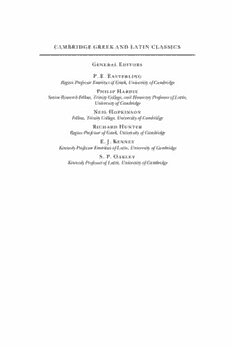Table Of ContentCAMBRIDGE GREEK AND LATIN CLASSICS
General Editors
P. E. Easterling
RegiusProfessorEmeritusofGreek,UniversityofCambridge
Philip Hardie
SeniorResearchFellow,TrinityCollege,andHonoraryProfessorofLatin,
UniversityofCambridge
Neil Hopkinson
Fellow,TrinityCollege,UniversityofCambridge
Richard Hunter
RegiusProfessorofGreek,UniversityofCambridge
E. J. Kenney
KennedyProfessorEmeritusofLatin,UniversityofCambridge
S. P. Oakley
KennedyProfessorofLatin,UniversityofCambridge
HORACE
O D E S
BOOK II
edited by
stephen harrison
CorpusChristiCollege,Oxford
UniversityPrintingHouse,Cambridgecb28bs,UnitedKingdom
CambridgeUniversityPressispartoftheUniversityofCambridge.
ItfurtherstheUniversity’smissionbydisseminatingknowledgeinthepursuitof
education,learningandresearchatthehighestinternationallevelsofexcellence.
www.cambridge.org
Informationonthistitle:www.cambridge.org/9781107012912
©CambridgeUniversityPress2017
Thispublicationisincopyright.Subjecttostatutoryexception
andtotheprovisionsofrelevantcollectivelicensingagreements,
noreproductionofanypartmaytakeplacewithoutthewritten
permissionofCambridgeUniversityPress.
Firstpublished2017
PrintedintheUnitedKingdombyClays,StIvesplc
AcataloguerecordforthispublicationisavailablefromtheBritishLibrary
LibraryofCongressCataloguinginPublicationdata
Horace,author.|Harrison,S.J.,editor.
OdesbookII/Horace;editedbyStephenHarrison.
Carmina.Liber2|CambridgeGreekandLatinclassics.
Cambridge:CambridgeUniversityPress,2017.|
Series:CambridgeGreekandLatinclassics
LCCN2016044122|ISBN9781107012912(hardback)
LCSH:Latinpoetry Historyandcriticism.
LCCPA6393.C422017|DDC874/.01 dc23
LCrecordavailableathttps://lccn.loc.gov/2016044122
isbn9781107012912Hardback
isbn9781107600704Paperback
CambridgeUniversityPresshasnoresponsibilityforthepersistenceoraccuracyof
URLsforexternalorthirdpartyinternetwebsitesreferredtointhispublication,
anddoesnotguaranteethatanycontentonsuchwebsitesis,orwillremain,
accurateorappropriate.
CONTENTS
Preface pagevii
ReferencesandAbbreviations ix
Introduction 1
1 DatingofOdes2 1
2 Horace’sLiteraryCareer 1
3 CharacteristicsofOdes2 6
(a) Theorderingandtopicsofthepoems 6
(b) Thebookofmoderation 8
4 LiteraryIntertexts 11
5 InternalArchitectureofthePoems 15
6 Style 17
7 Metre 19
8 Text 22
Q.HORATIFLACCICARMINVMLIBERSECVNDVS 25
Commentary 44
WorksCited 245
Indexverborum 263
GeneralIndex 265
v
PREFACE
I am most grateful to Philip Hardie, Michael Sharp and Cambridge
University Press for commissioning this commentary and for their
patience in waiting for it amid my many other duties and commit-
ments, and to Philip (again) and Stephen Oakley for their valuable
comments,editorialtoleranceandkindguidancewhichconsiderably
improved my text. At the copy-editing stage Muriel Hall ironed out
manysmallwrinklesandIthankherwarmly.
AllcommentariesoncanonicalworksofLatinliteraturehaveahigh
tralatitious element, but a commentary on Horace Odes 2 must lean
especiallyheavilyonNisbetandHubbard’sclassicworkofageneration
ago (1978), cited in this commentary as N–H. Readers will find con-
siderableeruditiononmanytopicstherewhichIhavenotrepeatedin
fullhere.Ihavetriedtoindicatebyexplicitcross-referenceswhereits
notesareespeciallyimportantorcontroversial,butIhavealsoadded
my own layer of analysis and interpretation and provided new and
updatedmaterial.MypersonaldebttoRobinNisbetisevendeeper,as
Ihadthebenefitofhisnotesandcriticismonmydraftcommentaries
onanumberofpoemsbeforehisdeathinMay2013,aswellasofhis
adviceandhelpovermanyyears;formytributetohimandhisworksee
BiographicalMemoirsofFellowsoftheBritishAcademyxiii(2014)365–82
(onlineatwww.britac.ac.uk/memoirs/).
Rapid increases in information technology since 1978 have eased
theworkofthecommentatorinanumberofsignificantways;someof
uscanstillrememberwhatitwaslikenottohavetoolswithwhichthe
wholeofLatinliteratureandtherelatedscholarshipcouldbeinstantly
searched. I would like to mention especially the splendid Oslo data-
base of conjectures on Horace now available freely online (www.teks
tlab.uio.no/horace/)andcitedinthecommentaryas‘Oslodatabase’,
to which I am fortunate to have had access from its beginning (my
thanks to Monika Asztalos for her kind help). The advent of the
complete Oxford Latin Dictionary since N–H has allowed me to be
economical with parallels, and I have generally only cited the
Thesaurus Linguae Latinae where OLD needs supplementation. In
termsofbibliography,Ihavebeenmoreconcernedwithpublications
laterthanN–H,sincetheylistthemajoritemspublishedearlier,and
debate has often moved on; a full listing of items on Horace for the
period1957–2007canbefoundinNiklasHolzberg’sexcellentonline
vii
viii PREFACE
bibliographyatwww.niklasholzberg.com/Bibliographien,andforthe
periodsince2007atwww.annee-philologique.com(bysubscription).
Crucial material support has come from Corpus Christi College,
Oxford, which has generously granted regular sabbaticals and a term
of unpaid research leave. I am also very gratefulto two munificent US
institutions:theLoebClassicalLibraryFoundation,whosetrusteesmade
a substantial grant which enabled me to begin the major work on this
projectintheacademicyear2009–10(withparticularthankstoRichard
Thomas),andtotheInstituteforAdvancedStudyatPrinceton,thattrue
paradise for scholars, which awarded me Membership and a generous
Edwin C. and Elizabeth A. Whitehead Fellowship for January–March
2015 (with particular thanks to Angelos Chaniotis); the commentary
wassubstantiallycompletedinthatsplendidcommunity.Materialfrom
the commentary in progress has been presented in various forms
at the Scuola Superiore Normale di Pisa, the UniversityofCambridge,
the University of Newcastle, the University of São Paulo (USP), the
University of Campinas (UNICAMP), Columbia University, Princeton
University,theInstituteforAdvancedStudy,Princeton,theUniversityof
Pennsylvania, the University of Virginia, Harvard University, the
University of Texas at Austin, the Georg-August-Universität Göttingen,
and the Polish Academy of Arts and Sciences in Kraków. I am most
grateful to all these audiences for helpful discussion and comment,
especially to Gian Biagio Conte at Pisa for inviting me to give the
LezioniComparettiin2010,toDenisFeeneyandhisgraduateclasson
the Odes in Princeton in Spring Term 2015, to Richard Thomas and
Albert Henrichs at Harvard, to David Kovacs and Tony Woodman at
VirginiaandtoJerzyDanielewiczinKraków(thelastparticularlyforhis
metricaladvice).
I am most grateful to Andrea Cucchiarelli, who read the whole
commentaryinfinaldraftandmademanyhelpfulcomments,andto
GesineManuwaldandStephenHeyworthwhoalsoreadandcommen-
tedonpartsofit.MywarmthanksalsogotoFiachraMacGóráinforhis
Dionysiac expertise on 2.19, to Henry Spelman for sending me an
advancecopyofanimportantnewarticleon2.8,toTheaThorsenfor
adviceonSapphoin2.20,toAlanGriffithsforsharingwithmeunpub-
lished work on 2.5, and to my former colleagues at IAS Princeton,
AngelosChaniotis,TedLendonandJohnMarincola,allofwhomgave
mesignificantadviceandmaterialon2.1.
S.J.H.
October2015
REFERENCES AND ABBREVIATIONS
The commentary makes use of the following abbreviations for other
commentaries on the Odes; full publication details are to be found in
WorksCited.
F C FedeliandCiccarelli2008
K H KiesslingandHeinze1930
Mayer Mayer2012
N Hi NisbetandHubbard1970(NB‘N Hi.xiii’=‘p.xiiiofthe
introductiontoNisbetandHubbard1970’,‘N Hon1.13.1’=
‘NisbetandHubbard’snoteonOdes1.13.1’)
N Hii NisbetandHubbard1978
N R NisbetandRudd2004
Porphyrio Holder1894(seeDiederich1999)
Ps.Acro Keller1902(seeKalinina2007)
Quinn Quinn1980
Syndikus Syndikus2001
Thomas Thomas2011
Standardcommentariesonothertextsarecitedbytheauthor’snameonly
(e.g.‘HarrisononVirg.A.10.1’);fulldetailsareagaintobefoundinWorks
Cited. Abbreviations for authors and text collections generally follow the
styleoftheOxfordLatinDictionary(2ndedn,2012=OLD)andLiddell,Scott
andJones(9thedn,1940=LSJ,withsomeupdating);otherabbreviations
usethestyleoftheOxfordClassicalDictionary(4thedn,2012=OCD).Inthe
text of the commentary, ‘Introduction’ means this introduction, while
‘introductionabove’meanstheintroductiontothepoemundercommen
tary. ‘Classical Latin’ means the period covered by OLD and the PHI
database (= Packard Humanities Institute, online at http://latin.pac
khum.org/about),i.e.untilc.200ce.
ix

